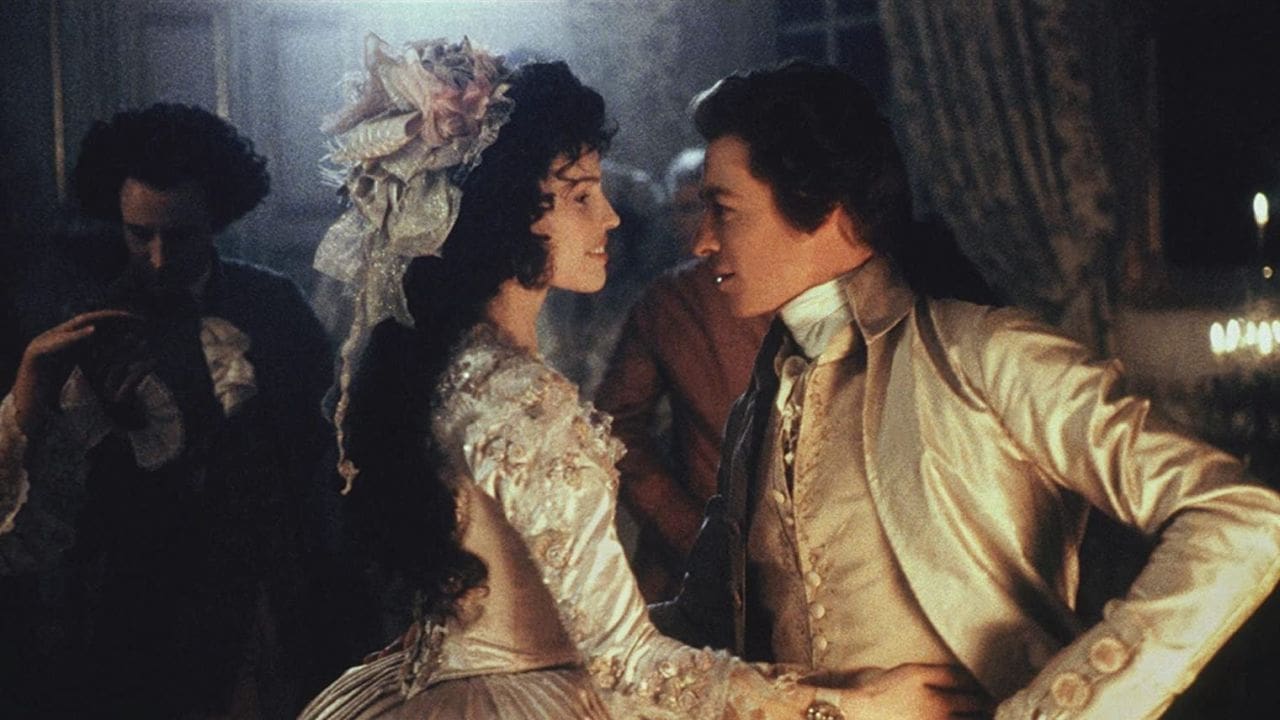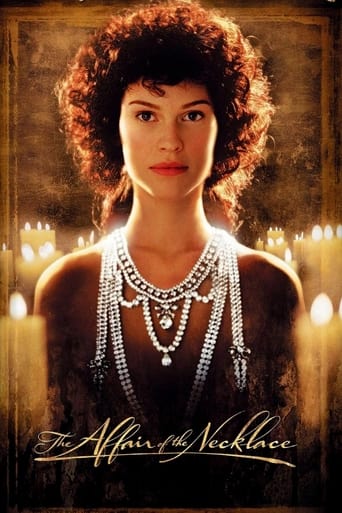

This is a period movie with an excellent cast and beautiful production. Unlike lot of others, the story is about a little story in the big one (the fate of a countess) but we can learn a lot of things about the Revolution and Monarchy. We can have also a good glimpse of a true mystery, Cagliostro (read "Rule by secrecy" by Jim Marrs). At last, it's also a thriller because we see a scheme invented, executed and punished. Nonetheless, this movie lacks something to be a real gem (no pun intended). Maybe it's a bit too long and too talkative but as a French living in Paris, the fundamental problem lies in the outdoors location: as soon as the characters go out, we see a Paris that doesn't exist: it's clear that it's Prague (except Versailles or Vaux Le Vicomte or the 1 second shoot of other buildings). But, it's a unusual movie in which the con is planned by a sincere and sympathetic woman and her ordeals can inspire future injustice. By the way, i think to have pick this movie for Eva and she appears only half a second on the sofa scene!..
... View MoreI am sure my petit fours comment piqued your interest...or at least confused you. I compare "The Affair of the Necklace" to this fancified little cake because like petit fours, the film looks great but once you sink your teeth into it, it is quite unappealing. Looks good--but that is all is how I see this film."The Affair of the Necklace" is a costume drama set in the latter period of the reign of Louis XVI of France. It's based on a true story of intrigue that only served to discredit the monarchy more and tip the nation a bit closer toward revolution. The problem is....who cares?! The film is too jam-packed full of knowing glances and quiet intrigues that it lacks the one important element in such a film--energy. You just don't care about the characters and the film is pretty but also quite empty.The film stars Hillary Swank--a very good actress and I am sure a nice person, but also a star hopelessly miscast. Her character is supposed to be an extremely desirable lady--but Swank just isn't that sort of actress and so the film was a stretch. I understood why the cast spoke English--it was NOT a French language production. But, it also seemed weird that the character of Marie Antoinette (Joely Richardson) was played by an English actress, as Marie was Austrian and SHOULD have had a German accent--or at least a trace of it. Regardless, the cast tried--but the material was too dry and too dull. The overall effort is slow going--and not especially involving.
... View MoreThe plot is very slight, which is a major part of the problem. The contemptuous way in which English is mixed with Yank is another part - for to actors, both supposedly French, to sound so anachronistic makes no sense. If they all spoke Yank, you could excuse it as a sort of Star Trek episode. If they all spoke English, you could perhaps concentrate on the plot and the acting. With the bizarre mixture (and the jarring anachronisms in speech) it made it painful to watch.The script was very poor. The actors did do their best to make it work, but it just wasn't credible dialogue. Of course, it was supposed to be anti-monarchy, no problems there, but to be so ham-fisted as to try to hammer this in at every stage by silly devices made one want to be a monarchist and cheer Marie Antoinette.
... View MoreThe infamous,and evil Giuseppe Balsamo,aka Alessandro,Count of Cagliostro,was arguably the most notorious fraud,charlatan,and bunko artist of the 18th century.And,as reliably portrayed in this story,he fit in rather nicely with the rest of the corrupt opportunists and swindlers.Having worked for 8 years as a prison psychologist in Ohio,it's been my observation that there are no guilty persons incarcerated.Instead,it seems as though the legal profession must be among the most corrupt and incompetent in existence.All of these innocent persons being advised by their counsel to plead guilty.My own observations is,that if they're not guilty of the offense for which they're being currently incarcerated,they ought to think about all the evil things that they've done and for which they've escaped punishment.It all comes out even in the wash,so to speak.So it goes with Cagliostro.While perhaps not legally culpable,he was certainly involved in this morally.And he DID escape punishment from the French.yet,he eventually got his.He moved to Rome.and opened a Masonic Lodge.Now,in Europe,the Masons aren't a men's service organization;They happen to be viewed as heresy.So,Cagliostro was arrested,brought before the Inquisition,and received the capital sentence.The Pope commuted the sentence to life imprisonment,and he spent the rest of his life in prison.MORAL:WE really don't need anyone else to foul up our lives,now,do we?We usually do a great job on our own.
... View More